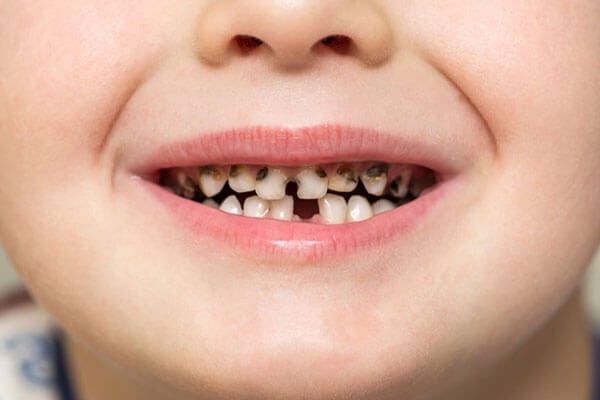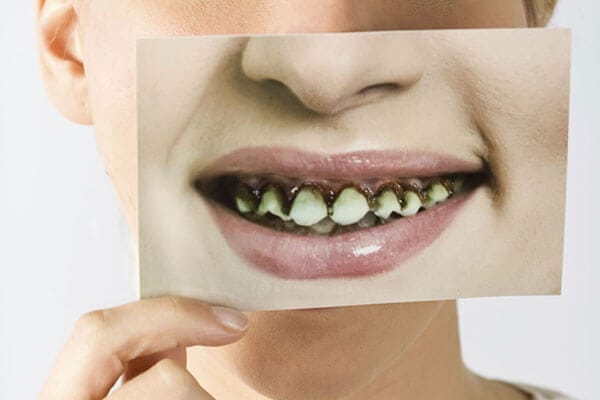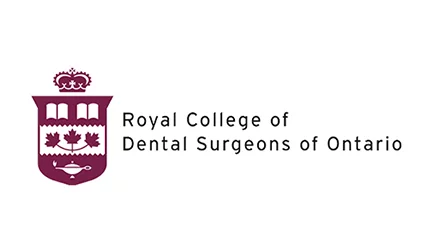BLACK TEETH STAINS: ITS CAUSES AND TREATMENT
Our teeth can turn black for various reasons. It’s not just an aesthetic concern, but it can also indicate underlying dental issues that can’t be ignored. Normally, our teeth range in color from white to whitish-yellow to whitish-gray, depending on the amount of calcium present in our enamel – the hard outer covering of our teeth.
In some cases, poor oral hygiene can also result in black staining on our teeth. Plaque and sugary foods containing acids can also erode the protective enamel coating of our teeth, leading to tooth decay and cavities. If left untreated, these dental problems can cause our teeth to take on a black or brown appearance. Therefore, it is crucial to take care of our oral health to maintain a bright and healthy smile.
COMMON CAUSES OF BLACK TEETH:
Maintaining clean and healthy teeth is essential for a beautiful smile. However, tooth discoloration can occur due to various reasons, both internal and external. External factors such as consuming dark foods or beverages, smoking, or using certain mouth rinses and toothpaste are the most common reasons for tooth discoloration. On the other hand, internal factors such as decay or cavities can also lead to black teeth.
If left untreated, the damage can spread from the inside to the surface, resulting in severe discoloration. Therefore, it’s important to take good care of your teeth, visit your dentist regularly, and avoid habits that can cause tooth discoloration.
SYMPTOMS:
It is not common for teeth to suddenly change from a white color to black. Typically, a person will notice some other signs before the tooth starts to turn black. For instance, a person’s teeth may become more sensitive, resulting in pain while eating or drinking, before the teeth discolor. Additionally, small black dots may also develop on the teeth, usually near the gum line.
When tartar is the main culprit, people will probably see black coloration on the molars’ outside or the front teeth’ inside. The discoloration caused by tartar will continue to worsen unless a dentist removes it. In such cases, holes may start to appear as the enamel erodes over time.
PREVENTIONS:
Maintaining proper dental hygiene is essential to prevent the development of black teeth. Individuals should make sure to brush their teeth twice a day with fluoride toothpaste and clean between their teeth with floss or interdental cleaners daily. It is also important to attend regular dental check-ups to ensure optimal oral health.
Additionally, avoiding or reducing the intake of certain substances can also be beneficial in preventing black teeth. These include coffee, cola, black tea, red wine, and tobacco products. By following these practices, individuals can significantly reduce their risk of developing black teeth and maintain a healthy, bright smile.
TYPES OF TOOTH STAINS:
There are two categories of tooth stains that affect the appearance and health of teeth. These categories are intrinsic stains and extrinsic stains.
1. EXTRINSIC STAINS:
Extrinsic stains are surface stains that appear on the tooth enamel, which is the outer layer of a tooth. These stains can be caused by several factors, such as smoking or tobacco use. In addition to that, drinking colored beverages, poor dental hygiene, taking liquid iron supplements through the mouth, or prolonged use of chlorhexidine mouthwash are also common reasons.
2. INTRINSIC STAINS:
Intrinsic stains are stains that affect the deeper layer of teeth or are due to abnormalities of tooth structure formation.
Some common causes of intrinsic stains include fluorosis and prescribing certain medications (such as tetracycline) to young children who have not completed tooth development. Dead teeth from trauma or congenital diseases such as cystic fibrosis are also common factors for black teeth.
TREATMENT OPTIONS:
Black teeth can be a daunting issue to deal with. Home whitening kits may offer some relief for mildly discolored teeth. But it is not usually possible to get rid of black teeth at home. You may require professional dental treatment to address this problem. It is important to consult a dentist who can carefully examine your teeth to diagnose the underlying cause of the issue. And recommend the most appropriate treatment. Only with the right diagnosis and treatment can you restore your teeth to their natural and healthy appearance.
CONCLUSION:
It is possible for a tooth to turn black due to staining, tartar buildup, or decay, and a dentist can help determine the cause. Regardless of the underlying issue, it is important to seek professional help to treat black teeth and prevent further damage. By practicing good dental hygiene, individuals can take steps to prevent black teeth from occurring. After receiving treatment for a black tooth, continued proper care can certainly help prevent a recurrence of the issue.













